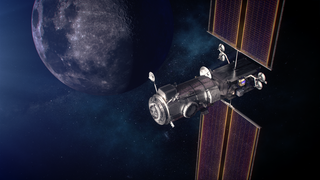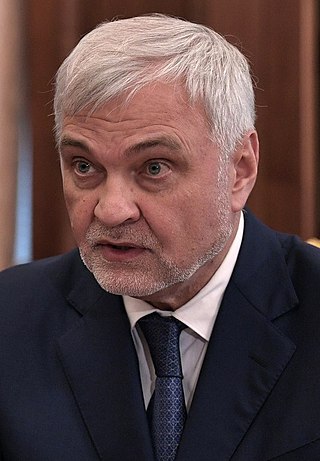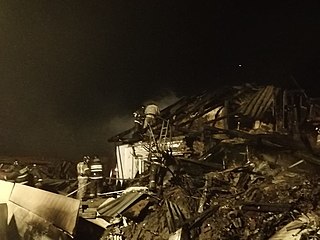Related Research Articles

The S-400 Triumf, previously known as the S-300 PMU-3, is a mobile, surface-to-air missile (SAM) system developed in the 1990s by Russia's NPO Almaz as an upgrade to the S-300 family.

MTV Russia or MTV Россия was a Russian music and entertainment TV channel, which carried out its broadcasting from September 25, 1998 to May 31, 2013. On October 1, 2013, MTV Russia was relaunched as a satellite pay TV channel.

Soyuz-2 is a modernized version of the Soviet Soyuz rocket. In its basic form, it is a three-stage launch vehicle for placing payloads into low Earth orbit. Compared to the previous versions of the Soyuz, the first-stage boosters and two core stages feature uprated engines with improved injection systems. Digital flight control and telemetry systems allow the rocket to be launched from a fixed launch platform, whereas the launch platforms for earlier Soyuz rockets had to be rotated as the rocket could not perform a roll to change its heading in flight.

2x2 is a Russian television channel. Founded in 1989, it was the first commercial TV station in the Soviet Union (USSR). The channel shut down in 1997, and resumed broadcasting in 2003. Since then, the channel has predominantly broadcast foreign animated TV series, including children's television series, anime and adult animation shows.
The history of delay-tolerant networking examines the bulk of the technologies that began the field that is known today as delay-tolerant networking. Research began as projects under United States government grants relating to the necessity of networking technologies that can sustain the significant delays and packet corruption of space travel. Initially, these projects looked only short-range communication between manned missions to the moon and back, but the field quickly expanded into an entire sub-field of DTNs that created the technological advances to allow for the Interplanetary Internet.

Tricolor TV is Russia's largest direct-to-home provider based in Saint-Petersburg and has broadcast two hundred TV channels in the European part of Russia and Siberia since 2005. As of October 2014, Tricolor TV provided satellite services to over fifteen million subscribers.

The Tornado is a family of related multiple rocket launchers developed by NPO Splav for the Russian Ground Forces. Variants of the system, which include the Tornado-G and Tornado-S models, have different capabilities and different battlefield roles. The Tornado is designed primarily to fire cluster munitions but also can be used to fire thermobaric warheads.
RUTUBE is a Russian video platform. It includes a library of licensed content including movies, series, cartoons, shows, and live broadcasts. It also hosts blogs, podcasts, game streams, and educational content.
Bella Alexandrovna Nisan is a Russian ophthalmologist, founder of modern methods of vision disorder correction. She is a member of the American Academy of Ophthalmology and a well-known proponent of the use of jet-injection devices in medicine.
Yamal-202 is a geostationary communications satellite operated by Gazprom Space Systems and built by RSC Energia. It was, along with Yamal-201 the second dual launch of the Yamal program and the second iteration of the USP Bus. It is a 1,320 kg (2,910 lb) satellite with 4,080 watts of power on an unpressurized bus. It has eight SPT-70 electric thrusters by OKB Fakel for station keeping. Its payload is 18 C-band transponders supplied by Space Systems/Loral.
Yamal is a communication and broadcasting system developed and operated by Gazprom Space Systems. Born out of the connectivity needs of the natural gas extraction giant Gazprom, the system was spun off in its own company, and opened the network to third parties and even went into the public broadcasting industry. Yamal and Russian Satellite Communications Company (RSCC)'s Ekspress constellation are the only two national satellite operators in Russia.

This article documents expected notable spaceflight events during the year 2024.

Dmitry Nikolayevich Patrushev is a Russian banker and politician serving as the Minister of Agriculture of Russia since 18 May 2018.

This article documents expected notable spaceflight events during the year 2025.

Vladimir Viktorovich Uyba, born in 1958, is a Russian statesman, scientist, and doctor, who is the acting Head of the Komi Republic since April 2, 2020. Before being appointed to that position, he was deputy health minister and head of the Federal Biomedical Agency.

Success Rockets is a Russian private space company that produces ultralight suborbital and orbital launch vehicles, small spacecraft, satellite constellations, and space tugs. The company was founded in 2020 by Oleg Mansurov. In October 2021, Success Rockets included subsidiaries in several Russian regions.

Vladimir Vladimirovich Mazur is a Russian statesman, who is currently serving as the 3rd governor of Tomsk Oblast in since 22 September 2022.

The crash of the Su-30 occurred at about 17:30 local time on 23 October 2022 in the city of Irkutsk in southern Russia. The Su-30SM aircraft was performing a test flight when it fell on a wooden two-story residential building in 2nd Sovetsky Lane. Both the pilots were killed. The residents of the house were not hurt as they were not home.
References
- ↑ "Всех накрыло "Сферой"". www.comnews.ru (in Russian). Retrieved 2022-11-18.
- ↑ ""Сфера" получила "Эфир" и бюджет". www.kommersant.ru (in Russian). 2018-07-18. Retrieved 2022-11-18.
- ↑ ""Дочка" "Роскосмоса" представила спутниковую систему "Эфир" за ₽299 млрд". РБК (in Russian). Retrieved 2022-11-18.
- ↑ "Проект "Роскосмоса" по всемирному доступу в интернет назовут "Эфир" - РИА Новости, 22.05.2018". 2018-05-22. Archived from the original on 2018-05-22. Retrieved 2022-11-18.
- ↑ "Оцифрованные миллиарды". www.kommersant.ru (in Russian). 2018-01-10. Retrieved 2022-11-18.
- ↑ "Вести Экономика ― "Роскосмос" создаст конкурента OneWeb Satellites". 2018-05-23. Archived from the original on 2018-05-23. Retrieved 2022-11-18.
- ↑ "Прямая линия с Владимиром Путиным • Президент России". 2018-06-10. Archived from the original on 2018-06-10. Retrieved 2022-11-18.
- ↑ "«Сфера» получила «Эфир» и бюджет – Газета Коммерсантъ № 126 (6364) от 19.07.2018". 2022-03-14. Archived from the original on 2022-03-14. Retrieved 2022-11-18.
- ↑ "Рогозин сообщил, что "Сфера" будет включать пять спутниковых группировок для телекома - Космос - ТАСС". 2021-10-25. Archived from the original on 2021-10-25. Retrieved 2022-11-18.
- ↑ (PDF) https://www.roscosmos.ru/media/pdf/22-10-press-kit.pdf.
{{cite news}}: Missing or empty|title=(help) - ↑ https://www.roscosmos.ru/38390/.
{{cite web}}: Missing or empty|title=(help) - ↑ "Началась сборка первого спутника глобальной российской системы "Сфера"". 2022-08-01. Archived from the original on 2022-08-01. Retrieved 2022-11-18.
- ↑ "Главное. Начались сборка и испытания первого спутника проекта "Сфера" - Новости - Госкорпорация "Роскосмос"". 2022-08-08. Archived from the original on 2022-08-08. Retrieved 2022-11-18.
- ↑ "Гендиректор ИСС Решетнева: мы разрабатываем пять спутниковых группировок для "Сферы" - Интервью ТАСС". TACC. Retrieved 2022-11-18.
- ↑ "Компания "ИСС" изготовит новый спутник связи". 2022-01-18. Archived from the original on 2022-01-18. Retrieved 2022-11-18.
- ↑ "Производитель сообщил, что группировка "Марафон" будет обновляться раз в пять лет". TACC. Retrieved 2022-11-18.
- ↑ "Более 130 спутников для интернета вещей "Марафон" запустят в 2025 году". TACC. Retrieved 2022-11-18.
- ↑ ""Никто не знает бизнес-модель Starlink и OneWeb": зачем нужна спутниковая группировка "Сфера" - Газета.Ru". 2022-05-31. Archived from the original on 2022-05-31. Retrieved 2022-11-18.
- 1 2 Новости, Р. И. А. (2022-05-29). "В "Роскосмосе" назвали сумму, необходимую для реализации проекта "Сфера"". РИА Новости (in Russian). Retrieved 2022-11-18.
- ↑ "Газпром космические системы / Новости / Больше, чем просто оператор спутниковой связи". www.gazprom-spacesystems.ru. Retrieved 2022-11-18.
- ↑ "Шесть спутников "Смотр" и 8 аппаратов "Ямал" планируется запустить в космос к 2035 году - гендиректор "Газпром Космические Системы" -". www.militarynews.ru. Retrieved 2022-11-18.
- ↑ "Шесть спутников "Смотр" и 8 аппаратов "Ямал" планируется запустить в космос к 2035 году - гендиректор "Газпром Космические Системы" -". www.militarynews.ru. Retrieved 2022-11-18.
- ↑ https://dzen.ru/video/watch/633a8181ba8fd136608023a6.
{{cite web}}: Missing or empty|title=(help)